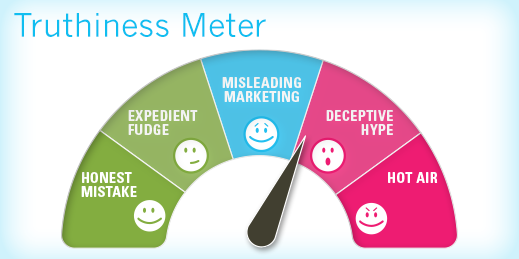In a world where fact-checking is old-fashioned and everything needs to be done yesterday, is it OK for marketers and content creators to cut a corner or two when it comes to the truth?
That would be a resounding “No!”
Despite (or maybe because of) today’s pace, it’s extra important to be careful about what you say now. Don’t have time to vet your content marketing or social efforts thoroughly? Someone will. And once it’s out there, it’s out there. Misinformation on Twitter, for example, spreads exponentially faster than any efforts to correct it.1
All the more reason to avoid any possible misperceptions, verify the validity of data and sources, and clarify in copy rather than fine print. But are marketers (and others) doing this? We took a look.
Rating 5 recent examples on our Truthiness Meter
![]()
USPS’s Maya Angelou stamp features a beautiful Maya Angelou quote – just not one written by Maya Angelou herself.2
A sticky situation but even the author of the quote was pretty forgiving. And President Obama made the same mistake in a speech about Angelou! As we said, once it’s out there, it’s out there.
![]()
Goldman Sachs’s thought leadership on millennials is partly drawn from a not-so-representative sample group: its own summer interns.3
Should we draw conclusions about the purchasing habits of an entire generation based on a survey of financial whiz kids working in Goldman’s big-city offices? While we understand the pressure to create content quickly, we’re not completely, um, buying this.
![]()
Old Navy’s “Americana” collection of t-shirts were made – where else? – overseas.4
OK, they never claimed they were “Made in the U.S.A.” But Old Navy certainly isn’t calling attention to the origin of their patriotic-slogan T’s. Oh say can you see this shirt was made in Vietnam?
![]()
A recent viral infographic on Coke describes what happens one hour after consumption: the bodily equivalent of a nuclear meltdown.5
Coke is certainly a reasonable target. Witness its calculated efforts to pin obesity on lack of exercise, not diet, or its claims that any hydration, even a sugary Coke, is good hydration. Still, this takedown seems overly frothy, if not technically inaccurate.
![]()
Presidential hopeful claims a 10-person company might downgrade an employee to part-time status because of the costs of Obamacare.6
Politicians are professional truth-stretchers, so we won’t name names here. But this Florida Republican (who isn’t named Jeb) really ought to know that the ACA only requires companies of 100 or more (50 in 2016) to provide affordable coverage to full-time employees.
Navigating a “truthy” world
It bears repeating – don’t believe everything you hear. In an age when everything is amplified and analyzed, we’ve all got to check the “facts” we read, write and cite in our marketing. If you’re going to err, err on the side of caution.
How are you balancing speed and accuracy?
We’d love to hear your thoughts on getting out vetted content in a fast-paced, social marketing environment. Comment below or email us.
Given the topic, we triple-checked our sources!
1 www.factcheck.org/2015/04/optimism-that-fact-checking-can-work/
2 www.nytimes.com/2015/04/09/us/postal-service-wont-reissue-maya-angelou-stamp.html?_r=0
3 www.goldmansachs.com/our-thinking/pages/millennials/
4 www.huffingtonpost.com/entry/55bfa328e4b06363d5a2d70b
5 www.truthinadvertising.org/old-navys-americana-ts-made-overseas/
6 www.factcheck.org/2015/08/rubios-shaky-aca-hypothetical/


 See what they have to say
See what they have to say
I liked this one. Fun to read and a good reminder.